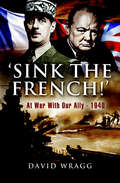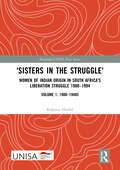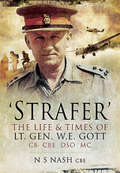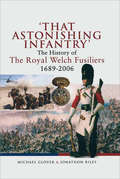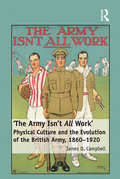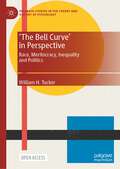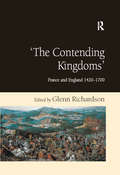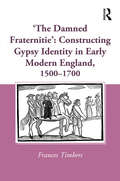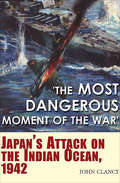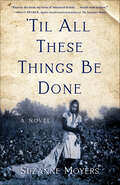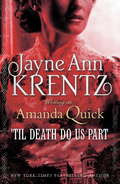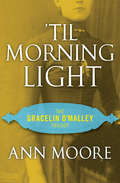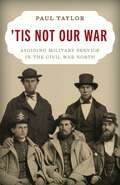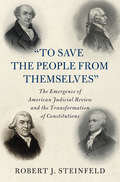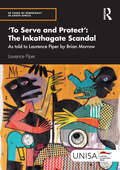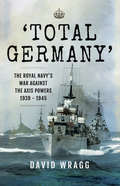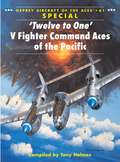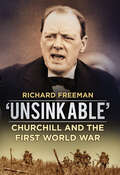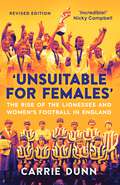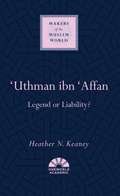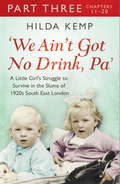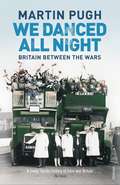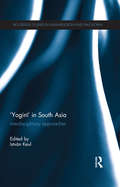- Table View
- List View
'Sink the French!': At War with Our Ally—1940
by David WraggA history-defining moment in World War II, when the allied nations of England and France stood on the precipice of betrayal—and war with each other. After the forces of Nazi Germany launched their Blitzkrieg assault on Holland, Belgium, and Northern France, the tentative relationship between Great Britain and France was strained to the limit. For when the Vichy regime surrendered, the British had grave fears that the Germans would force the French naval fleet—the fourth largest in the world—to turn against their former ally, while in fact their orders were to scuttle should the Germans attempt to seize them. ‘Sink the French!’ examines the precursors to the fall of France and its consequences, most particularly the way the French Navy was dealt with. It examines the confused situation that France’s defeat created, including the rise of a relatively junior French general, Charles de Gaulle, who was smuggled out of France by the RAF. Elsewhere French ships were boarded and seized by the British, and at Oran, Algeria, their fleet was bombarded by the Royal Navy—just as there were other incidents including French aircraft bombing Gibraltar. This insightful exploration of a world sinking into chaos—and the mistrust war can breed between allies—is a must-read for anyone interested in this pivotal moment in history, when opposition to the Nazis was almost broken.
'Sisters in the Struggle': Women of Indian Origin in South Africa's Liberation Struggle 1900–1994 (VOLUME 1: 1900–1940s) (Routledge/UNISA Press Series)
by Kalpana Hiralal‘Sisters in the struggle’: Women of Indian Origin in South Africa’s Liberation Struggle 1900–1994 unveils an unchartered historical terrain, highlighting the contributions of Indian women towards non-racialism and equality and their experiences within diverse political parties; therefore, shifting the post-apartheid liberation stories which have been dominated by the journey of the ANC to other political organisations who collectively played a significant role in South Africa’s road to democracy. In this book, Hiralal presents a refreshing perspective of Indians, particularly women, as contributors and activists in the struggle. The book elucidates that the struggle against apartheid was a collective endeavour among the oppressed races and not a one-sided endeavour by the ANC. The book, thus, examines the participation of Indian women against apartheid and colonialism within gendered and political frameworks.
'Strafer': The Life & Killing of Lt. Gen. W.E. Gott CB CBE DSO MC
by N. S. NashUnexpectedly selected by Churchill to command 8th Army in 1942 in place of the sacked Auchinleck, 'Strafer' Gott was targeted by German intelligence as he flew to Cairo to take up his new post. Six ME109s intercepted his aircraft and, after shooting it down, deliberately machine-gunned the crash scene. Gott became the only Allied general to be successfully targeted by the Germans and, as a result, Montgomery was given command and the rest is history.But as this long overdue and well researched biography reveals, 'Strafer' deserves to be remembered for his exceptionaltalents, meteoric career and record of gallantry. As a young officer in The Great War he won the Military Cross (many thought a VC would have been more appropriate) and he repeatedly attempted to escape. In 1939 he was commanding his Battalion as a Lieutenant Colonel and two years later he became a Lieutenant General. He was recognised as a superb Desert General whose aggression, originality and leadership qualities were supported by charm, warmth and compassion.While it is fascinating, if unproductive, to surmise what would have happened had Gott and not Monty fought Rommel, it can be confidently said that relations with our allies would have benefitted.Drawing on primary source material, this first biography of an outstanding soldier and commander is not only a rewarding and revealing read but an important addition to the bibliography of the Second World War.As featured in the Dover Express, Ashford Herald and Folkestone Herald.
'That Astonishing Infantry': The History of The Royal Welch Fusiliers, 1689–2006
by Michael Glover Jonathon RileyThe Royal Welch Fusiliers were present at all Marlborough's great victories; they were one of the six Minden regiments; they fought throughout the Peninsula and were present at Wellington's final glorious victory at Waterloo. In The Great War their officers included the writer poets Siegfried Sassoon and Robert Graves; their 22 battalions fought not just on the Western Front but at Gallipoli, in Egypt, Palestine, Salonika, Mesopotamia and Italy. In WW2 they won battle honours from the Reichswald to Kohima. More recently they have served with distinction in the war against terror in the Middle East. Like so many famous regiments the RWF are no longer in the British Army's order of battle having been amalgamated into the Royal Regiment of Wales. But this fine book is the lasting memorial to a fiercely proud and greatly admired regiment.
'The Army Isn't All Work': Physical Culture and the Evolution of the British Army, 1860–1920
by James D. CampbellBetween the Crimean War and the end of the First World War the British Army underwent a dramatic change from being an anachronistic and frequently ineffective organization to being perhaps the most professional and highly trained army in the world. Historians have tended to view that transformation through the successive political reform efforts of those years, but have largely overlooked the ways in which the Army transformed itself from within. This change was effected through the modernization of training, operational and leadership doctrines. The adoption of formal physical training and organized games played a central part in this process. With its origins in elite public schools and upper-class country homes, the Army's philosophy of Athleticism was a part of the ethos of 'muscular Christianity' widely held in contemporary British institutions. Under the potent influence of this philosophy, military sport went from a means of keeping soldiers from drink and the officers from duty, to an institutionalized form of combat training. This book documents the origins and development of formal physical training in the late Victorian Army and the ways in which the Army's gymnastic training evolved into a vital building block of the process of turning a civilian into a fighting man. It also assesses the nature and extent of British military sport, particularly regimental sports, during this period of evolution for the Army. Through an investigation of the Army's physical culture during this dynamic period, one can gain an understanding of not only how the Army's change from within occurred, but also of some of the important links between the Army and its parent society.
'The Bell Curve' in Perspective: Race, Meritocracy, Inequality and Politics (Palgrave Studies in the Theory and History of Psychology)
by William H. TuckerThis open access book examines the implications of The Bell Curve for the social, economic, and political developments of the early 21st century. Following a review of the reception of The Bell Curve and its place in the campaign to end affirmative action, Professor Tucker analyses Herrnstein’s concept of the “meritocracy” in relation to earlier 20th century eugenics and the dramatic increase in economic inequality over the past 30 years. Tucker demonstrates how, contrary to The Bell Curve’s predictions, the reallocation of these huge sums was neither rational nor beneficial for society. The book moves on to situate The Bell Curve within contemporary politics and shows how it can be seen to have played a role in the 2016 US election. This compelling analysis will appeal to scholars and those with an interest in the history of scientific racism, the history of psychology and the sociology of knowledge and science.This is an open access book.
'The Contending Kingdoms': France and England 1420–1700
by Glenn RichardsonThe kingdoms of France and England were for many centuries military, economic, cultural and colonial rivals. This is particularly true of the early modern period which witnessed the rise of French military hegemony and the expansion of English commerce. Dealing with the period 1420-1700, this collection offers a snapshot of Anglo-French relations across the three centuries from established historians and younger scholars from France, Britain and Luxembourg. Based broadly on 'diplomatic' history, but incorporating wider perspectives from cultural and social or gender history; each essay uncovers the fascinating and complex arrangements that characterize Anglo-French relations in this period. Competition and hostility between the two kingdoms there certainly was, but it took a surprising variety of forms and often proved intellectually productive for one side or the other and sometimes for both. The chapters mix treatments of broad themes and particular circumstances or individuals and each makes specific comparisons with French and English experience across the early-modern period. In so doing they elaborate and go beyond the evidence of Anglo-French hostility to explore evidence of political co-operation and cultural influences, highlighting just how close early modern England's connections with France were, even at times of crisis.
'The Damned Fraternitie': Constructing Gypsy Identity in Early Modern England, 1500–1700
by Frances Timbers'The Damned Fraternitie': Constructing Gypsy Identity in Early Modern England, 1500–1700 examines the construction of gypsy identity in England between the early sixteenth century and the end of the seventeenth century. Drawing upon previous historiography, a wealth of printed primary sources (including government documents, pamphlets, rogue literature, and plays), and archival material (quarter sessions and assize cases, parish records and constables's accounts), the book argues that the construction of gypsy identity was part of a wider discourse concerning the increasing vagabond population, and was further informed by the religious reformations and political insecurities of the time. The developing narrative of a fraternity of dangerous vagrants resulted in the gypsy population being designated as a special category of rogues and vagabonds by both the state and popular culture. The alleged Egyptian origin of the group and the practice of fortune-telling by palmistry contributed elements of the exotic, which contributed to the concept of the mysterious alien. However, as this book reveals, a close examination of the first gypsies that are known by name shows that they were more likely Scottish and English vagrants, employing the ambiguous and mysterious reputation of the newly emerging category of gypsy. This challenges the theory that sixteenth-century gypsies were migrants from India and/or early predecessors to the later Roma population, as proposed by nineteenth-century gypsiologists. The book argues that the fluid identity of gypsies, whose origins and ethnicity were (and still are) ambiguous, allowed for the group to become a prime candidate for the 'other', thus a useful tool for reinforcing the parameters of orthodox social behaviour.
'The Most Dangerous Moment of the War': Japan's Attack on the Indian Ocean, 1942
by John Clancy“A well-detailed account of the [World War II] raid, which badly stung the Royal Navy but which the Japanese failed to exploit to a strategic advantage” (Seapower).In early April 1942, a little-known episode of World War II took place. Said by Sir Winston Churchill to be “the most dangerous moment of the war,” the Japanese made their only major offensive westwards into the Indian Ocean. As historian Sir Arthur Bryant said, “A Japanese naval victory in April 1942 would have given Japan total control of the Indian Ocean, isolated the Middle East and brought down the Churchill government.”Having crippled the American fleet at Pearl Harbor, the Japanese turned their sights on the British Eastern Fleet based at Ceylon. Occupation of Ceylon, now Sri Lanka, would not only provide the Japanese a springboard into India but also control of the essential convoy routes to Europe and the Western Desert. And aside from the British Eastern Fleet, the Indian Ocean lay undefended.In April 1942, a Japanese fleet led by six aircraft carriers, four battleships, and thirty other ships sailed into the Bay of Bengal. In the ferocious battles that followed, the British lost a carrier, two heavy cruisers, and many other ships; however, the Japanese eventually turned back, never to sail against India again. John Clancy, whose father survived the sinking of HMS Cornwall during the battle, “masterfully combines the strategic overview, the tactical decision making and many personal experiences to bring this episode of the war to life” (WWII Today).“Absolutely enthralling.” —Books Monthly“Well researched . . . a balanced view of men acting under the stress of war during a critical time.” —WWII History
'Til All These Things Be Done: A Novel
by Suzanne MoyersSet against the rich but often troubled history of Blacklands, Texas, during an era of pandemic, scientific discovery, and social upheaval, the novel offers a unique—yet eerily familiar—backdrop to a universal tale of triumphing over loss. Even as dementia clouds other memories, eighty-three-year-old Leola can’t forget her father’s disappearance when she was sixteen. Now, as Papa appears in haunting visions, Leola relives the circumstances of that loss: the terrible accident that steals Papa’s livelihood, sending the family deeper into poverty; a scandal from Mama’s past that still wounds; and Leola’s growing unease with her brutally bigoted society. When Papa vanishes while seeking work in Houston and Mama dies in the “boomerang” Influenza outbreak of 1919, Leola and her young sisters are sent to an orphanage, where her exposure of a dark injustice means sacrificing a vital clue to Papa’s whereabouts. That decision echoes into the future, as new details about his disappearance suggest betrayal too painful to contemplate. Only in old age, as her visions of Papa grow more realistic, does Leola confront her long-buried grief, leading to a remarkable family discovery that could offer peace, at last.
'Til Death Do Us Part
by Amanda QuickCalista Langley operates an exclusive 'introduction' agency in Victorian London, catering to respectable ladies and gentlemen who find themselves alone in the world. But now, a dangerously obsessed individual has begun sending her trinkets and gifts suitable only for those in deepest mourning - a black mirror, a funeral wreath, a ring set with black jet stone. Each is engraved with her initials.Desperate for help and fearing that the police will be of no assistance, Calista turns to Trent Hastings, a reclusive author of popular crime novels. Believing that Calista may be taking advantage of his lonely sister, who has become one of her clients, Trent doesn't trust her. Scarred by his past, he's learned to keep his emotions at bay, even as an instant attraction threatens his resolve.But as Trent and Calista comb through files of rejected clients in hopes of identifying her tormentor, it becomes clear that the danger may be coming from Calista's own secret past - and that only her death will satisfy the stalker...
'Til Morning Light (The Gracelin O'Malley Trilogy #3)
by Ann MooreAn Irish mother faces her destiny in California as the acclaimed trilogy comes to an end—&“a vibrant picture of American history in the mid-19th century&” (Historical Novel Society). With her two children, Gracelin O&’Malley travels to post–Gold Rush San Francisco to meet the sea captain who has proposed marriage to her. But when she arrives, he is nowhere to be found. Destitute in a city filled with gangs, disillusioned soldiers, and professional gamblers, Grace takes a position as a cook for one of the city&’s most prominent doctors—only to become caught up in a tangled web of blackmail and betrayal. Determined to make a secure life for her children and find her brother, Sean, Gracelin sets in motion a series of events that change the future of everyone around her, never dreaming that the man she thought she&’d lost forever is still alive and determined to find his way back to her. Dickensian in scope, with a full cast of riveting characters, Ann Moore&’s &’Til Morning Light is the stunning conclusion to the enthralling story of Gracelin O&’Malley, a heroine for the ages.
'Tis Not Our War: Avoiding Military Service in the Civil War North
by Paul TaylorJames McPherson&’s classic book For Cause & Comrades explained &“why men fought in the Civil War&”—and spurred countless other historians to ask and attempt to answer the same question. But few have explored why men did not fight. That&’s the question Paul Taylor answers in this groundbreaking Civil War history that examines the reasons why at least 60 percent of service-eligible men in the North chose not to serve and why, to some extent, their communities allowed them to do so. Did these other men not feel the same patriotic impulses as their fellow citizens who rushed to the enlistment office? Did they not believe in the sanctity of the Union? Was freeing men held in chains under chattel slavery not a righteous moral crusade? And why did some soldiers come to regret their enlistment and try to leave the military?&’Tis Not Our War answers these questions by focusing on the thoughts, opinions, and beliefs of average civilians and soldiers. Taylor digs deep into primary sources—newspapers, diaries, letters, archival manuscripts, military reports, and published memoirs—to paint a vivid and richly complex portrait of men who questioned military service in the Civil War and to show that the North was never as unified in support of the war as portrayed in much of America&’s collective memory. This book adds to our understanding of the Civil War and the men who fought—and did not fight—in it.
'To Save the People from Themselves': The Emergence of American Judicial Review and the Transformation of Constitutions (Cambridge Historical Studies in American Law and Society)
by Robert J. SteinfeldIn this expansive history, Robert J. Steinfeld offers a thorough re-interpretation of the origins of American judicial review and the central role it quickly came to play in the American constitutional system. Beginning with Privy Council review of American colonial legislation, the book goes on to provide detailed descriptions of the character of the first American constitutions, showing that they drew heavily on traditional Anglo/American constitutional assumptions, which treated legislatures as the primary interpreters of constitutions. Steinfeld then expertly analyses the central role lawyers and judges played in transforming these assumptions, creating the practice and doctrine of American judicial review in a half dozen state cases during the 1780s. The book concludes by showing that the ideas formulated during those years shaped critical decisions taken by the Constitutional Convention of 1787, which turned the novel practice into a permanent, if still deeply controversial, feature of the American constitutional system.
'To Serve and Protect': As told to Laurence Piper by Brian Morrow (30 Years of Democracy in South Africa)
by Laurence PiperThis book provides a detailed account of the history, consequences, and events leading up to the ‘Inkathagate Scandal’ which changed the course of South African history. It states that Inkathagate was the work of one man – Brian Morrow – who outraged by the racism, corruption and torture rife in the Security Branch of the South African Police in Durban where he worked, resolved to do something to expose the reality of apartheid hidden from white South Africa and the world. It also discusses the Inkatha files, which Morrow had covertly copied and handed to the media in 1991, and also analyses Morrow’s purpose, ambitions, and what followed after.Print editions not for sale in Sub-Saharan Africa. This book is part of Routledge’s co-published series 30 Years of Democracy in South Africa, in collaboration with UNISA Press, which reflects on the past years of a democratic South Africa and assesses the future opportunities and challenges.
'Total Germany': The Royal Navy's War Against the Axis Powers 1939–1945
by David WraggThe author of A Century of British Naval Aviation, 1909-2009 examines the losses and successes of the Royal Navy during World War Two. On the declaration of war in 1939, the British Admiralty signaled all warships and naval bases &“Total Germany, Total Germany.&” It was fortunate that of Germany&’s three armed services, the Kriegsmarine under Grosseradmiral Erich Raeder was the least well prepared. True, Admiral Karl Donitz&’s U-Boat force was to give the Allies many anxious times, but Hitler was never comfortable or competent in his handling of naval surface forces. &“Total Germany&” is a concise yet comprehensive account of the Royal Navy&’s part in the war at sea and the measures taken to ensure victory. The different approaches taken by the warring countries are expertly examined. The author reviews the differing strategies and tactics of the various theatres such as the Far East, Mediterranean, Atlantic and Arctic. &“Not only does it cover every major event during WWII the author brings up some other less well known actions. A thoroughly enjoyable read.&”—Ton Class Association
'Twas the Night After Christmas (The Hellions of Halstead Hall #6)
by Sabrina JeffriesNew York Times bestselling author Sabrina Jeffries&’s &“exceptionally entertaining&” (Booklist) Hellions of Halstead Hall series offers a charming gift of a romance about an unexpected Christmas reunion that&’s sparked by a clever ruse.Pierce Waverly, the Earl of Devonmont, has never forgiven his parents for inexplicably abandoning him to distant relatives as a child. Nevertheless, when he receives word that the stranger he calls &“Mother&” is gravely ill, the unabashed rogue makes a rare return to Montcliff, his country estate. There he finds that the woman is perfectly healthy—and that he has fallen for a cunning ruse crafted by her lady&’s companion, Mrs. Camilla Stuart. The lively vicar&’s widow, too bright and beautiful not to arouse the scoundrel in Pierce, is determined to reconcile the Earl and Lady Devonmont. None of them can predict the secrets, both heartening and shocking, divulged between a mother and son, or between two lovers, each haunted by their pasts, that will make this Christmas night at Montcliff one to remember—and the glorious night after, one to treasure for a lifetime in this &“sharply witty, deliciously sexy&” (Library Journal) romance.
'Twelve to One' V Fighter Command Aces of the Pacific
by Tony Holmes Chris DaveyThis volume details the experiences of 107 elite American aces in combat against the Japanese. The highest scoring US pilots of World War 2 fought against the Japanese Army Air Force and Imperial Japanese Navy over the jungles of New Guinea and the Philippines. Flying P-38s and P-47s, men such as Dick Bong and Thomas McGuire won the Medal of Honor for their successes in combat in 1943-45. 'Twelve to One' is a rare document that details the 'tricks of the trade' employed by these men. This volume also includes biographies of the men whose tips for aerial combat make up the text, and the V Fighter Command Manual.
'Union is Strength'
by Albert SchrauwersNineteenth-century Canada experienced two other revolutions apart from those of W.L. Mackenzie and Louis Riel: the transition to capitalism, and to responsible government. Union Is Strength argues that these major socio-political changes happened in Ontario without a revolutionary moment because of the intertwined relationship of reformers with capitalists. Examining a small, utopian socialist group named the Children of Peace, Albert Schrauwers traces the emergence of a vibrant democratic culture in the province from the decade before the Rebellions of 1837. Schrauwers shows how the overlapping boards of unincorporated joint stock companies managed by both Toronto reformers and the Children of Peace produced a culture of deliberative democracy in competition with the "gentlemanly capitalism" of chartered corporations. Noting the ways in which Ontario's capitalist and democratic revolutions were linked through cooperative joint stock operations, he also situates these revolutions in an international context and links them to the development of Owenite socialism and Chartism in the United Kingdom. Union Is Strength is an insightful study of both nineteenth century Canada and the ways in which regional political cultures arise.
'Unsinkable': Churchill and the First World War
by Richard Freeman‘Unsinkable’ is the story of a man unjustly vilified: Churchill in the First World. His enemies – the Tory party – censured him for Antwerp, the Dardanelles and Gallipoli. He could do no right and was regarded as a dangerous maniac. But the true story is quite the opposite. This book tells how, as a brilliant First Sea Lord, Churchill was ousted by his enemies, yet clawed his way back to power against all the odds. As the leading critic of senselessly sending men to march towards machine guns his calls for ‘machines not men’ went unheeded. After a spell in the trenches he returned to London to clear his name over the Dardanelles. Then he relentless fought his way back to power through his brilliant, incisive criticism of the land war. The unsinkable politician finally became Munitions Minster in 1917, where he pushed output to unimagined levels. His weapons delivered the victory that had eluded others for the previous three years.
'Unsuitable for Females': The Rise of the Lionesses and Women's Football in England
by Carrie DunnShortlisted for the 2023 Sports Book Awards for Best Football Writing of the Year Discover the origins of the Lionesses that brought football home. England's Lionesses are on the front and back pages; their stars feature on prime-time television; they are named in the national honours lists for their contribution to their sport and to society. The names of Lucy Bronze, Steph Houghton and Ellen White are emblazoned across the backs of children’s replica jerseys. These women are top athletes – and top celebrities. But in 1921, the Football Association introduced a ban on women’s football, pronouncing the sport 'quite unsuitable for females'. That ban would last for half a century - but despite official prohibition the women’s game went underground. From the Dick, Kerr Ladies touring the world to the Lost Lionesses who played at the unsanctioned Women's World Cup in Mexico in 1971, generations of women defied the restrictions and laid the foundations for today's Lionesses - so much so that in 2018 England's Women’s Super League became the first fully professional league in Europe...when just a few decades previously women were forbidden to play the sport in England at all. This book tells the story of women’s football in England since its 19th-century inception through pen portraits of its trailblazers. The game might have once been banned because of its popularity – find out about the subversive women who kept organising their teams and matches despite the prohibition, who broke barriers and set records – the legends of the game who built the foundations of the stage upon which today’s stars flourish. 'At what feels like a pivotal moment, Carrie’s forensic research and depth of knowledge make her the perfect person to guide us through the constantly changing landscape of women’s football' - Kelly Cates, TV presenter
'Uthman ibn 'Affan: Legend or Liability? (Makers of the Muslim World)
by Heather N. Keaney&‘Uthman ibn &‘Affan (d. 656) was an early convert to Islam and the third successor to the Prophet Muhammad. As caliph he established the first Islamic navy, consolidated the text of the Qur&’an, and expanded the Arab empire. His opponents, however, accused him of being corrupt and questioned his legitimacy. After twelve years &‘Uthman&’s troubled caliphate ended in revolt. His death at the hands of rebels led to civil war and contributed to the eventual split between Sunni and Shi&’i Islam. In this volume, Heather Keaney examines the life and legacy of the controversial caliph.
'We Ain't Got No Drink, Pa': Part 3
by Cathryn Kemp Hilda KempWe Ain't Got No Drink, Pa can either be read as full-length eBook or in 3 serialised eBook-only parts.This is PART 3 OF 3.'We ain't got no drink, Pa.' I trembled as I spoke. Then somewhere inside me I found the anger, the courage to answer him back. 'We don't have no grog cos you drank it all!' I knew he was going for me tonight, so I reckoned I might as well go down fighting after all. Growing up in the slums of 1920s and 30s Bermondsey, Hilda Kemp's childhood was one of chaos and fear. Every day was battleground, a fight to survive and a fight to be safe. For Hilda knew what it was to grow up in desperate poverty: to have to scratch around for a penny to buy bread; to feel the seeping cold of a foggy docklands night with only a thin blanket to cover her; to share her filthy mattress with her brothers and sisters, fighting for space while huddling to keep warm. She knew what it was to feel hunger - not the impatient growl of a tummy that has missed a meal; proper hunger, the type that aches in your soul as much as your belly. The eldest of five children, Hilda was the daughter of a hard drinker and hard hitter as well. A casual dockworker by day, a bare-knuckle fighter by night and a lousy drunk to boot, her pa honed his fists down the Old Kent Road and Blackfriars, and it was Hilda or her ma who bore the brunt of them at home. This is the powerful and moving memoir of Hilda's childhood growing up in dark, filthy, crime-ridden Bermondsey; a place where you knew your neighbours, where you kept your eyes down and your ears shut as defence against the gangs at war in the streets. It's a time when days were spent running wild down the docklands, jumping onto barges and stealing coal, racing through the dank back-streets of east London like water rats, dodging the milk cart or the rag-and-bone man. And out of this bleak landscape emerges a brave, resilient young girl whose life is a testament to the power of love and good humour. Moving, dazzling and sombre by turns, once opened this brilliant, seductive book will not let you rest.
'We Danced All Night': A Social History of Britain Between the Wars
by Martin PughMartin Pugh offers a uniquely untraditional view of Britain’s inter-war period; that among the many dramatic social changes taking place, our modern consumer society of dedicated shoppers effectively took shape during the 1930s.
'Yogini' in South Asia: Interdisciplinary Approaches
by István KeulIn different stages in the history of South Asian religions, the term yoginī has been used in various contexts to designate various things: a female adept of yoga, a female tantric practitioner, a sorceress, a woman dedicated to a deity, or a certain category of female deities. This book brings together recent interdisciplinary perspectives on the medieval South Asian cults of the Yoginis, such as textual-philological, historical, art historical, indological, anthropological, ritual and terminological. The book discusses the medieval yoginī cult, as illustrated in early Śaiva tantric texts, and their representations in South Asian temple iconography. It looks at the roles and hypostases of yoginīs in contemporary religious traditions, as well as the transformations of yoginī-related ritual practices. In addition, this book systematizes the multiple meanings, and proposes definitions of the concept and models for integrating the semantic fields of ‘yoginī.’ Highlighting the importance of research from complementary disciplines for the exploration of complex themes in South Asian studies, this book is of interest to scholars of South Asian Studies and Religious Studies.
